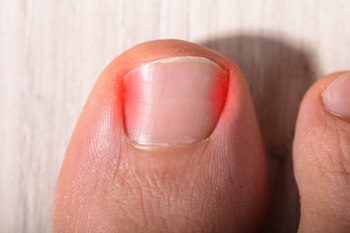
Ingrown toenails occur when the nail grows into the surrounding skin causing pain, swelling, and sometimes infection. Common causes include improper nail trimming by cutting nails too short or rounding the edges, leading the nail to grow into the skin. Wearing tight or narrow shoes can also push the nail into the skin, increasing the risk. Other common causes include trauma, such as stubbing or injuring the toe, and repetitive pressure from activities like running. Less common causes include genetic predisposition, where nail shape naturally curves into the skin, and nail disorders or fungal infections that alter nail growth. A podiatrist diagnoses ingrown toenails by examining the affected toe for signs of redness, swelling, and infection. Treatment varies by severity, with mild cases usually requiring trimming and proper nail care guidance. More severe cases may need partial nail removal, antibiotics for infection, and sometimes a minor surgical procedure to prevent recurrence. If you have an ingrown toenail, it is strongly suggested that you visit a podiatrist for proper treatment.
Ingrown toenails can become painful if they are not treated properly. For more information about ingrown toenails, contact one of our podiatrists of Apple Podiatry Group. Our doctors can provide the care you need to keep you pain-free and on your feet.
Ingrown Toenails
Ingrown toenails occur when a toenail grows sideways into the bed of the nail, causing pain, swelling, and possibly infection.
Causes
- Bacterial infections
- Improper nail cutting such as cutting it too short or not straight across
- Trauma to the toe, such as stubbing, which causes the nail to grow back irregularly
- Ill-fitting shoes that bunch the toes too close together
- Genetic predisposition
Prevention
Because ingrown toenails are not something found outside of shoe-wearing cultures, going barefoot as often as possible will decrease the likeliness of developing ingrown toenails. Wearing proper fitting shoes and using proper cutting techniques will also help decrease your risk of developing ingrown toenails.
Treatment
Ingrown toenails are a very treatable foot condition. In minor cases, soaking the affected area in salt or antibacterial soaps will not only help with the ingrown nail itself, but also help prevent any infections from occurring. In more severe cases, surgery is an option. In either case, speaking to your podiatrist about this condition will help you get a better understanding of specific treatment options that are right for you.
If you have any questions please feel free to contact our offices located in Arlington Fort Worth, And Flower Mound, TX . We offer the newest diagnostic and treatment technologies for all your foot and ankle needs.